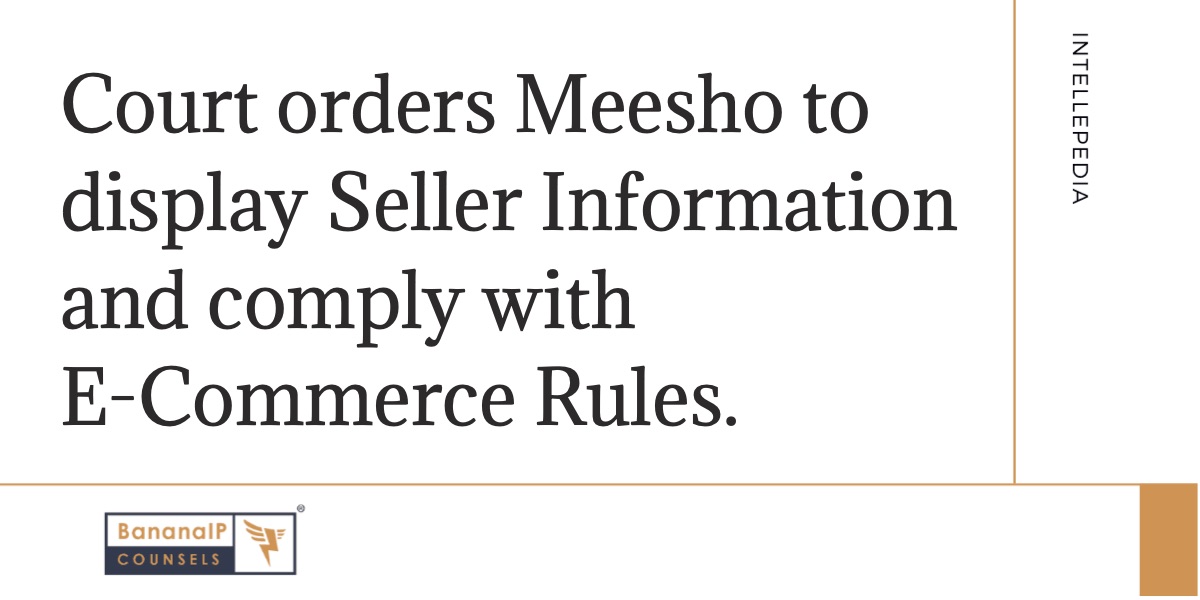The Delhi High Court has ordered Fashnear Technologies, owner of the meesho.com platform (“Meesho”), to take definitive steps to comply with legal and regulatory requirements. The Court also asked Meesho to display full seller details in its listings as well as invoices to facilitate transparency, and to ensure the resolution of copyright and trademark disputes effectively. This order was passed in a case filed by Abhi Traders against Meesho, 9 known defendants, and other unknown defendants.
Abhi Traders sells garments with specific designs on different platforms including Meesho. On Meesho it has a rating of 4.0 with more than 30, 000 ratings and 660 reviews. Noting that several sellers were selling products on Meesho using its copyrighted images and designs, Abhi Traders contacted Meesho to take down the products but received no response. As no seller information was displayed on the platform or the invoices, Abhi Traders could not take action against the sellers, and despite requesting details, Meesho did not share the same with Abhi Traders.
Aggrieved, Abhi Traders filed a copyright infringement and passing off the case against Meesho and the defendant sellers. After reviewing the facts and evidence adduced, the Court came to the conclusion that the plaintiff had made out a prima facie case of copyright infringement and passing off. It therefore granted an ex-parte injunction restraining the defendants from using the copyrighted images and/or the designs of Abhi Traders. The Court also asked Meesho to comply with applicable eCommerce Rules and intermediary guidelines.
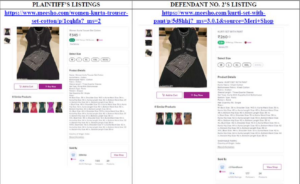
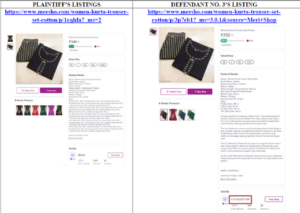
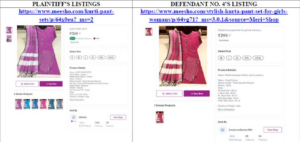
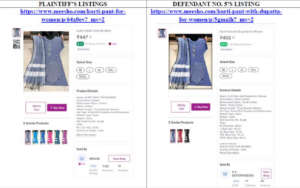
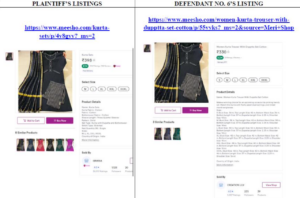
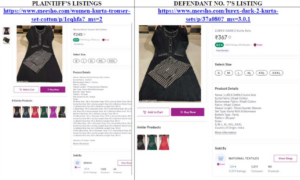
Relevant Paras
Relevant Paras of the Court order read as follows:
“24. The Court, having considered the submissions presented and the comparative chart of look-alike products provided by the Plaintiff, finds that a prima facie case has been established. It appears that Defendants No. 2 to 9, along with the unidentified Defendant No. 10, are egregiously exploiting the Plaintiff’s product images, listing visuals, and product designs for their financial gain, leveraging the Plaintiff’s reputation. Such sellers are unequivocally not entitled to replicate the Plaintiff’s photographs, images, or product designs in such a manner, thereby inflicting harm upon the Plaintiff. While this Court acknowledges the pivotal role of e-commerce platforms in offering new opportunities for small designers and enterprises, it is imperative that these platforms are not exploited to facilitate the imitation of products and the infringement of intellectual property rights. The production of look-alike products, misuse of product images that infringe upon the Plaintiff’s copyrights undermines the integrity of fair trade and competition, warranting intervention to protect the Plaintiff’s lawful interests.
25. There is also an obligation upon the E-Commerce platform to ensure that complete details of the sellers are available on the platform so that the consumer is aware of the sellers from whom the product has been purchased and the entity, who is listing the product. The Consumer Protection (E- Commerce) Rules, 2020, notified on 23rd July, 2020, imposes an obligation as per section 5, on the e-commerce platform to give the full geographic address, customer care number, rating and other feedback about the seller for enabling consumers to make informed decision at the pre-purchase stage.”
26. Under these circumstances and considering the complete imitation, which has been indulged by Defendant Nos.2 to 9 and other unknown Defendants, the Plaintiff has made out a case for grant of an ex-parte ad interim Injunction. It is also in the interest of consumers that such look-alike products are not permitted to be sold. Balance of convenience is also in favour of the Plaintiff. Irreparable harm would be caused if the injunction is not granted, as on online platforms and marketplaces, it is extremely easy for sellers to proliferate the images and continue to dupe customers. Accordingly, following directions are being issued in the matter:
(1) Defendants No. 2 to 9, along with any other sellers who are showcasing their products on the Meesho.com platform, are hereby prohibited from reproducing, copying, publishing, or imitating any designs of the Plaintiff’s clothing. This injunction also extends to the prohibition against reproducing any images related to the Plaintiff’s products, including photographs.
(2) The aforesaid Defendants are also restrained from duplicating any of the Plaintiff’s designs, as illustrated above for comparative purposes, as well as any other designs/images belonging to the Plaintiff concerning its clothing line.
(3) The Defendant No.1 shall reveal all the available details of the aforesaid sellers including the address, mobile numbers, email addresses, total sales made by the sellers, GST details, payments made to the sellers since the time listings have been put up.
(4) The Plaintiff shall give a complete list of infringing URLs to counsel for Defendant No.1 within seven working days in order to enable the Defendant No.1 to take down the said listings. The said taking down shall be carried out within 72 hours.
(5) While Ms. Endlaw has assured that Defendant No.1 is complying with this requirement, the Court nonetheless directs that Defendant No. 1 must take definitive action to ensure that the geographic address of all sellers is clearly displayed in the invoice published on the platform. This would enhance transparency and accountability among sellers utilizing the platform, facilitating easier resolution of any disputes or inquiries related to copyright or trademark infringement, and ensuring compliance with legal and regulatory requirements.”
Citation: Mr. Anshuman Upadhyay vs Fashnear Technologies Pvt. Ltd. & Ors., High Court of Delhi, 29th February, 2024, CS(COMM) 180/2024
Disclaimer
The case note/s in this blog post have been written by IP Attorneys at BananaIP Counsels based on their review and understanding of the Judgments. It may be noted that other IP attorneys and experts in the field may have different opinions about the cases or arrive at different conclusions therefrom. It is advisable to read the Judgments before making any decisions based on the case notes.
If you have any questions, or if you wish to speak with an IP expert/attorney, please reach us at: [email protected] or 91-80-26860414/24/34.

